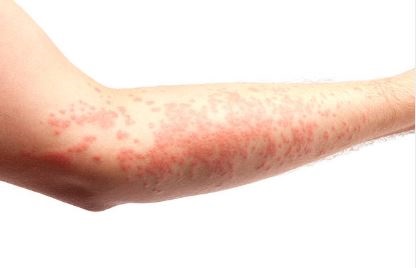Did you know that there are over 3 million instances of people seeking help for psoriasis each year in the United States? That fact alone is not very comforting, but knowing that there can be relief from your psoriasis is definitely a step in the right direction. So, if you suffer from this common, chronic, inflammatory disease of the immune system, read on to learn what treatments are available to help.

What Is Psoriasis?
Psoriasis is a disease that affects over 7 million people in the United States. It is a common chronic, inflammatory disease of the immune system and involves the skin and joints. Psoriasis occurs when the body sends faulty signals which tell the skin cells to grow too rapidly. The body does not shed these extra cells, so they pile onto the surface of the skin causing patches of red, raised skin which becomes scaly and itchy. Psoriasis can appear on the scalp, hands, feet, knees, and elbows. Patients suffering from psoriasis often report that they have times that it flares up, followed by times that it is less severe. Fortunately, the condition is not contagious.
What Type of Treatments Are Available?
The goal of treatments for psoriasis is to find the most effective way to slow cell turnover with the fewest possible side effects. These treatments are intended to reduce inflammation and clear the skin as well. There are three basic types of treatments available.
- Topical Treatments. Topical treatments include creams and ointments that are applied to the skin to treat mild to moderate psoriasis. These can include simple moisturizers which are applied twice daily to reduce itching, scaling, and dryness. Other topical treatments can contain salicylic acid, which promotes the sloughing off of dead skin cells. Another type of topical treatment involves corticosteroids, which are prescription strength and can only be used for short periods of time during flare-ups.
- Light Therapy. Light therapy uses natural and artificial ultraviolet light exposure to UV rays to slow skin cell turnover, reduce scaling, and to decrease inflammation. UVB therapy uses controlled doses of UVB rays for single, stubborn patches of psoriasis. The key to light therapy is the control that the physicians use over the amount of UVA or UVB rays to which a person is exposed. Talk to your dermatologist about getting outdoors on your own for this light exposure for important facts about sunscreen and amounts of time to spend in the sun.
Oral and Injected Medications. Oral and injected medications contain ingredients that decrease the production of skin cells and suppress inflammation. Oral medications are typically taken once or twice each day at the convenience of the patient’s home. Injectable treatments target specific parts of the immune system by blocking the action of the cells that play a major role in developing psoriasis. Injections are also typically administered by the patients themselves in their own homes. Injectable treatments are effective treatments that most patients find effective and convenient.
Which Treatment Is Right For Me?
The best way to determine which treatment is right for your psoriasis is to schedule a visit at Dermatology and Plastic Surgery of Arizona with Dr. Christopher Weyer, Board Certified Dermatologist. He will be able to make an accurate diagnosis of your condition and then based on your individual needs, will customize a treatment plan that is right for you. Over time, he will monitor your condition and fine-tune your treatment plan to help you have the clearest, most comfortable skin possible.
Take the Next Step
We would love to help you start your journey to clearer, healthier skin. There is no need to suffer from itchy, scaly, or inflamed skin when help is close by! Take the next step and schedule a consultation with Dr. Christopher Weyer. You can do this by calling his Tucson office at 520-207-3100 or his Sierra Vista location at 520-458-1787. You may also schedule an appointment by completing the form on this page. His offices are conveniently located at 698 East Wetmore, Suite #310 in Tucson, Arizona and 150 South Coronado Drive Suite #110 in Sierra Vista, Arizona.

